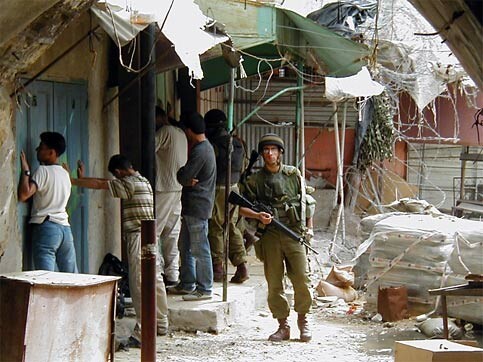
An Israeli soldier checks Palestinian IDs in Hebron. (CPT)
14 November 2004 - Detained in solidarity
This morning, I was heading out of the Old City of Al-Khalil (Hebron) for Al-Quds (Jerusalem) when I was stopped by a soldier. It was actually the same Russian woman who was involved in my prior arrest; she smiled at me, asked if I remembered her, and then demanded my passport. Apparently the rumor was going around that I had been deported for terrorist activity after my arrest, so she was probably surprised to see me.
CPTers have grown accustomed to just breezing through the Beit Romano Checkpoint in the Old City where we live. We pass through it regularly and usually without question. Some Palestinians who live in the area also have this privilege once the soldiers recognize them, however they are sometimes subject to detention and harassment. When the solider took my passport and ordered me to sit on the curb, I thought of the dozens of Palestinians I see detained here daily, and I sat down without argument.
It was annoying to have my trip delayed, but I was glad to have a better understanding of what Palestinians go through every day, and I remembered how much better my worst-case scenario would be if the detention ended in arrest. The two CPTers I was with observed the situation and I felt even safer. I looked around for a stray cat to play with, but none were near. I was isolated, sitting on a hard curb, at the mercy of soldiers younger than me. This is solidarity.
The Israeli police arrived within five minutes of the soldier’s call. When was the last time you called the police and they came within five minutes? I was glad to see a significant amount of Palestinians were passing by unhindered while the soldiers and police argued about what to do with me. I figure the police negated the rumor that I’d been deported, and refused to arrest me since they had no grounds, not even dubious ones. My passport was returned and I was released, it all took a little over a half hour.
As I sat there in the last few minutes of my detention, I noticed two small Palestinian boys fighting near by. One was hitting the other with a stick, and an older boy came and pushed them apart, took away the stick and broke it, scolding the boys for their behavior. Grassroots violence de-escalation I thought, I truly do have a lot to learn from the Palestinians. I may as well be treated like one.
16 November 2004 - Privilege Poisons
Last night I went up to Tel Aviv to visit a Jewish American friend of mine who’s studying there. I hadn’t been outside Palestine besides East Jerusalem in a while, and boy is it surreal.
East Jerusalem is kind of like what Palestine would be without as heavy an occupation. It is certainly poor and restricted, but it has been able to develop some commercial activity while maintaining Palestinian culture and atmosphere. Walking a few blocks into West Jerusalem, it is a different world entirely. Heading from there up to Tel Aviv, I feel like I’m in an entirely different world, and I don’t like it.
Having grown to love the simplicity and kindness of Palestine, I now abhor the overprivileged and commercialized amusement park that is Israel. Crops in rows, mismatched forest area and desert, tall modern buildings, power lines, gas stations and McDonalds’, it is absolutely hideous. And then there’s the rudeness. Now don’t get me wrong, I know plenty of really nice, warm, loving Israelis, but the atmosphere on the street couldn’t be more different than Palestine.
Take taxis for example. Israeli cab drivers do their best to rip me off every single time, when in Palestine there have been times where the driver didn’t even let me pay. I have never had so many people try to cut in front of me in a line than in an Israeli store, and when I ask an Israeli for directions, about half the time they glare at me for speaking English or ignore me and walk away.
I know that hospitality is a central part of Semitic culture, Jewish, Muslim, and Christian alike. So why is it that the ethic of hospitality is so alive in impoverished Palestine, but almost dead in industrialized Israel? My answer: privilege.
The overprivilege of the West is a direct result of the underprivilege of the so called Third World; Americans embody the epitome of this privilege, but it is more obvious here where the overprivileged and underprivileged live so close together. Generally, I have found that poorer and less privileged people are more warm, loving and supportive in their interactions.
When people must scrape for their bare necessities, friends and family become more important. The richer people get I’ve found, the less happy, loving and generous they become. We become so obsessed with our material possessions, that we forget what’s really important in life.
Privilege is poisonous. It is built on the backs of our brothers and sisters, and we will not escape that suffering. My distaste for Israel is my distaste for this system of materialism, privilege, and unhappiness; it is my distaste for America; and it is my distaste for myself.
Joe Carr is a 23-year-old peace activist from Kansas City, Missouri. He has worked Earth First, Food Not Bombs, and Arts in Activism. In 2003, he coordinated for the International Solidarity Movement in Rafah, Palestine, and witnessed Israeli soldiers murder US peace activist Rachel Corrie, and British peace activist Tom Hurndall. He now works with the Christian Peacemaker Teams in Al Khalil (Hebron), Palestine and in the US Palestinian Rights Movement.




